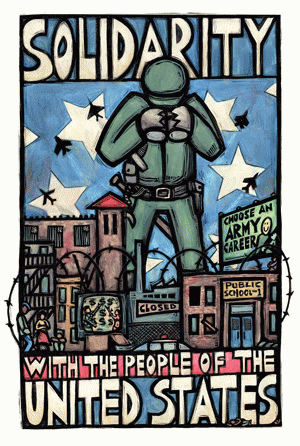The cold winds of political repression have begun to blow a little colder. The widening FBI probe of the anti-war and solidarity movements--launched with coordinated raids in Minneapolis and Chicago in September, 2010--attests to the expanding reach of Washington's repressive apparatus. The new face of domestic repression is characterized by rapidly developing technical capacity for surveillance and data sharing, the integration of local policing into the national security system and a blurring of boundaries between private and government police functions and goals.
Repression--the use of state power to limit political action and discourse--doesn't develop in isolation. It compensates for the weakening of other, less intrusive methods for ensuring social stability. Today it corresponds to growing economic inequality driven by the flight of manufacturing, the demolition of public sector services, the decline of union power and the ascension of a ravenous financial sector. These changes severely strain the mechanisms that maintain popular consensus.
Our task in the following pages will be to note current trends in political and social police repression, identify some of the systemic vulnerabilities they betray and to find points of leverage from which to launch a pro-democracy counteroffensive. We are experiencing a system-wide assault on the democratic public space that, besides police activity, encompasses attacks on academic expression, criminalization of whistle-blowing, corporatization of elections and hobbling the open internet. Piecemeal, defensive strategies will not be adequate. We will need to mount a challenge to the repressive enterprise as a whole. In particular I would assert that our strategy should promote solidarity and cooperation among the sectors that bear the brunt of repression but have historically remained separate in their responses.
Within days of the September raids, several hundred people turned out at a south side community church in Minneapolis to begin organizing a defense campaign. Several days later, a similar-sized crowd gathered on the city's north side to support the family of Fong Lee, a Hmong teenager killed by police in 2006, at that time appealing his case to the US Supreme Court. Between them, these cases embody the two levels of a police-repressive system that has operated in the United States since its earliest days.
The September raids marked a shift in the "anti-terror" narrative. Until then the domestic front of the "war on terror" had targeted dark people with foreign names and accents. Almost all of the thousand or so terrorism cases pursued since 9/11 have been instances of entrapment, involving financially desperate, mentally unstable or otherwise vulnerable men in Muslim communities. These hapless individuals have been cajoled, threatened and even bribed into conspiratorial activities conceived, financed and equipped by the FBI. These prosecutions have not foiled real threats to public safety but they do "send a message" that the nation is under attack from Islam at home and abroad and must "circle the wagons" in defense.
This time the targets are US citizens, predominantly of European descent and with respectable, mostly white collar jobs; well-known in their communities for public protest and educational activities. Repression usually targets those who can easily be isolated and moves up the social ladder as it builds the case that enemies are all around us. This is the principle famously summed up by Pastor Martin Neumoller in his 1946 statement, "First they came for the Communists-- The September raids represent a rather abrupt leap up that ladder, risking an outpouring of support for their targets that has, indeed, materialized.
It has been widely noted that the raids came on the heels of a Justice Department report critical of the FBI for spying on peaceful activism. Their timing suggests a defensive move on the part of the Bureau, saying, in effect, "See, peace activists really are in league with terror!"
The report was released by the DoJ's Inspector General under pressure from Senators, following a Pittsburgh newspaper expose. A revealing incident in its pages involves an agent sent to observe a protest organized by the pacifist Thomas Merton Center. When pressed by investigators to justify the spying, Bureau officials quickly created a false back story (complete with paper trail) to pretend that their intent was to keep tabs on Farooq Houssaini, the director of the local Islamic Center. The problem is that they had no legitimate reason to spy on Houssaini either! The officials seemed to assume that by linking the protest to a prominent member of an Ethnically Targeted Community (an ETC), they would escape criticism. A similar ploy may be discerned in the September raids; the inclusion of a single Palestinian, Hatem Abudayeh (the respected director of Chicago's Arab American Action Network), to provide the necessary intimation of guilt (more Palestinians were targeted in a subsequent round of subpoenas).
Next Page 1 | 2 | 3 | 4 | 5 | 6 | 7
(Note: You can view every article as one long page if you sign up as an Advocate Member, or higher).





